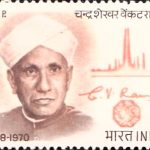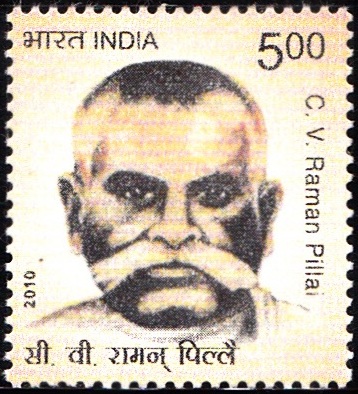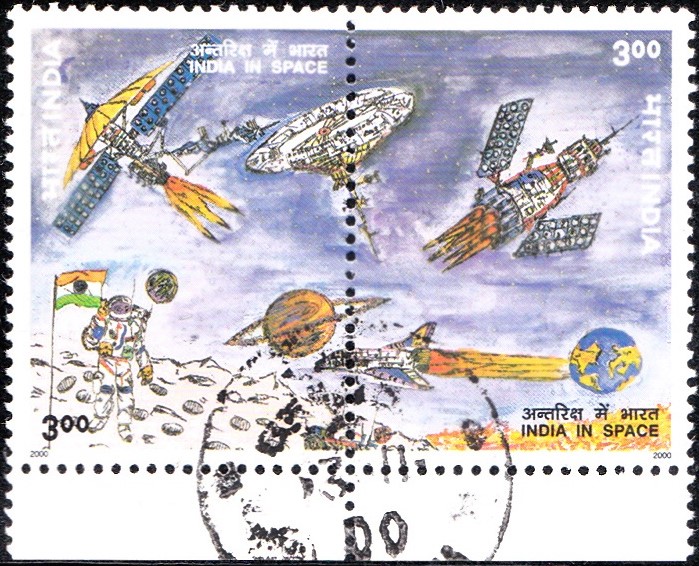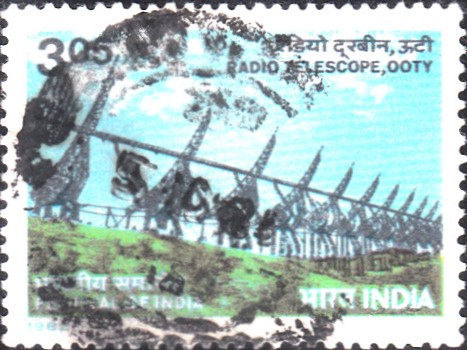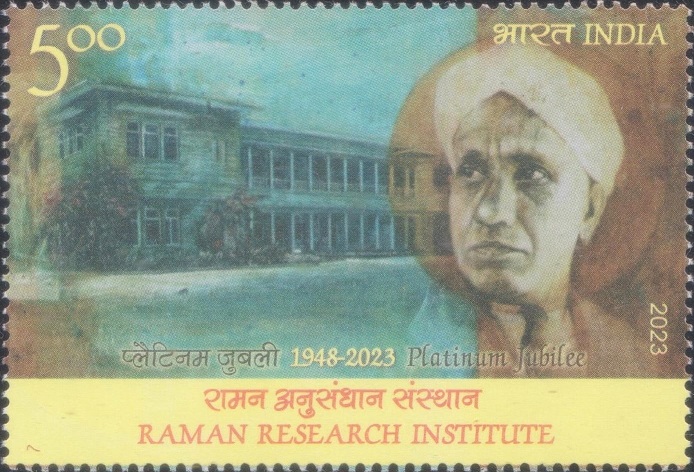
Raman Research Institute
A commemorative postage stamp on the Platinum Jubilee (1948-2023) of Raman Research Institute (RRI), an institute for scientific research located in Bengaluru :
 Issued by India
Issued by India
Issued on Nov 7, 2023
Issued for : The Department of Posts is delighted to release Commemorative Postage Stamp on the occasion of Platinum Jubilee of Raman Research Institute and salutes its contribution in India’s advancement in science and technology.
Credits :
Stamp/FDC/Brochure : Ms Gulistaan
Cancellation Cachet : Smt. Nenu Gupta
Type : Stamp, Mint Condition
Colour : Multi Colour
Denomination : 500 Paise
Stamps Printed : 316600
Printing Process : Wet Offset
Printer : Security Printing Press, Hyderabad
About :
- The Raman Research Institute (RRI) is a premier research institution in India, pursuing cutting edge fundamental research in select frontier areas of Physics under contemporary research themes. Founded by Indian Science Nobel Laureate Sir C V Raman in 1948, the Institute was established on a plot of land gifted by the then Maharaja of Mysore, Krishnaraja Wodeyar IV. Raman served as the Institute’s Director, carrying on his personal research until his demise in 1970.
- In 1971, RRI became the first autonomous institution to be funded by the then newly formed Department of Science and Technology, Government of India. The Institute has, since then, carried forward the legacy of its founder and embarked on several research activities of national importance.
- Currently RRI’s thrust research areas cover Astronomy & Astrophysics, Light & Matter Physics, Soft Condensed Matter and Theoretical Physics – an impressive breadth of research starting from the very large – on the scale of the Universe to the very small – on the scale of atoms. The Institute, with its unique history, has seasoned over time; the profiles of both the Scientific and Technical staff have evolved organically, thereby sealing for itself a credible space in the national and international arena of sciences.
- Among the Institute’s many scientific achievements, of which three highly noteworthy have been highlighted –
- (1) The prediction and discovery of Discotic Liquid Crystals. In 1993, Fuji Films recognized this discovery as a solution to the problem of Wide Viewing screens. Today, the Discotic Liquid Crystals are used in most commercial LCD (Liquid Crystal Display) screens as WV films to provide wide angle viewing.
- (2) The prediction of the precise form of the “chirp” signals emerging from the merger of black holes and the “ring-down” signal at the end of this event. Both these were validated by the Laser Interferometer Gravitational wave Observatory (LIGO) in September 2015, which, for the first time, confirmed gravitational waves from a coalescing black hole binary.
- (3) Executing successful radio telescope projects in India and overseas, as well as playing significant roles in building and doing science with precursor radio telescopes in the lead up to the Square Kilometer Array (SKA), the proposed world’s largest and most sensitive radio telescope.
- On November 7, 2022, the Institute entered its 75th year. Over the course of the ongoing Platinum Jubilee year, RRI will host multiple national and international conferences, prestigious lecture series and have enhanced science outreach activities. Several distinguished Indian citizens including dignitaries from the Government of India, eminent scientists from within India and across the world, are on the guest list for the various events lined up this year. Notably, the Platinum Jubilee year is being celebrated under the hugely successful Azadi Ka Amrit Mahotsav banner. This year also marks the celebration of the achievements of the Institute’s faculty, scientists and students, who have contributed towards nation building during the past 75 years. As the inheritors of an ancient culture, that has valued science and technology, the Institute’s founder, Sir C V Raman, is undoubtedly a modern-day example!
- At the threshold of its 75th year, the Institute is now ideally poised to take on newer challenges in the pursuit of path-breaking research. For instance, the Institute plans to leverage from the substantial fundamental research knowledge output, produced by RRI cluster of Quantum Laboratories, in developing Quantum-Enabled technologies aligning with the National Mission on Quantum Technologies and Applications. RRI envisions to further strengthen its collaborations with the Indian Space Research Organization (ISRO), particularly in the areas of Quantum Communication, X-Ray and Radio Astronomy.
- The Institute is exploring opportunities to ink fresh collaborations with the space agency, and shoulder work in emerging research areas, namely developing Terahertz detector technology, initiating millimeter to sub-millimeter-band Astronomy in India from both ground and space, among others. RRI also encourage well-planned, promising and challenging initiatives with path-breaking science goals, such as the ongoing experimental efforts to detect the subtle global signals from the Cosmic Dawn, known as the Epoch of Reionization, or the long-term developments targeting the cosmic recombination lines of hydrogen from the early Universe and likewise.
- Along with knowledge creation, RRI has trained, readied and instilled courage in the country’s next generation to take-on challenging problems in Science via its vibrant PhD, Postdoctoral, Research Assistant and Visiting Students Program. Upholding the Institute’s academic traditions, by regularly hosting both national and international conferences, workshops and prestigious lectures. RRI has taken sustained efforts to open its doors and allow science from inside its labs to reach the general public, at large.
- RRI strive to make useful contributions towards mega science projects like the SKA in radio astronomy alongside being ambitious to assume leadership roles, both in the current and upcoming mega science projects, such as LIGO-India, the third of the LIGO detectors, being built on Indian soil.
- The Institute maintain its tradition of actively promoting individual research excellence, coupled with technological capabilities that are developed in-house, thus aligning to the ‘Make in India’ initiative of becoming self-reliant towards enabling frontier research in all the above-mentioned fields.
- Text : Referenced from content provided by Proponent.
Subscribe
Login
0 Comments
Oldest


